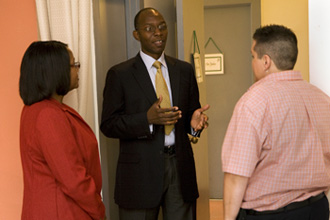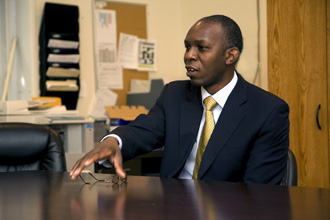Rwanda Reaches Out to Tulane
Dr. Patrick Kyamanywa, dean of the medical faculty at the National University of Rwanda, visited Tulane last week to explore Rwanda's plan to expand its medical education, research and community care programs. Visiting the Tulane Community Health Center at Covenant House, he marveled that it is the first university-operated community clinic of its type that he has seen.

Dr. Patrick Kyamanywa, center, dean of the medical faculty at the National University of Rwanda, tours the Tulane Community Health Center at Covenant House with center chief medical officer Dr. Eboni Price-Haywood, left, and lead primary care provider Dr. Michele Simoneaux. (Photos by Ryan Rivet)

Dr. Patrick Kyamanywa discusses ways to implement ideas he learned at Tulane, as he works to develop medical education and health care after the 1994 genocide in Rwanda.
The government of Rwanda, located in east Africa, is initiating a comprehensive plan to create a high quality and sustainable health care system, particularly one that will reach 10 million Rwandans, most of whom are in rural communities.
“Through Tulane University, we've been able to write a seven-year strategic plan for the medical school up to the year 2018 that is a roadmap to relate with our different partners,” Kyamanywa said. “We have a clear vision, clear objectives and a clear roadmap, so we are in the driver's seat.”
The Rwandan government wants the quality of its graduating doctors to match that in developed countries. Rather than benchmarking progress against other African countries, Rwanda is using Singapore as a vision.
Tulane, one of Rwanda's longest-running partners in the health sector, has worked in Rwanda since 1999 through multimillion-dollar grants and contracts from the U.S. Agency for International Development, the Centers for Disease Control and Prevention, and the World Bank.
Kyamanywa visited Tulane through the university's most recent cooperative agreement with the CDC.
Rwanda has overcome great obstacles since the 1994 genocide, while meeting many of its development goals, says Nancy Mock, co-director of the Tulane Disaster Resilience Leadership Academy and associate professor of public health. She is co-principal investigator with Laura Haas of the cooperative agreement that includes Tulane faculty and staff in the Payson Center for International Development, and the schools of medicine, public health and tropical medicine, and social work.
“Tulane collaborators are honored to work with such a dedicated and talented team assembled by the Government of Rwanda to address its health problems,” Mock said. “Rwanda is a very focused, disciplined and hard-working country that has set goals and achieved them.”
